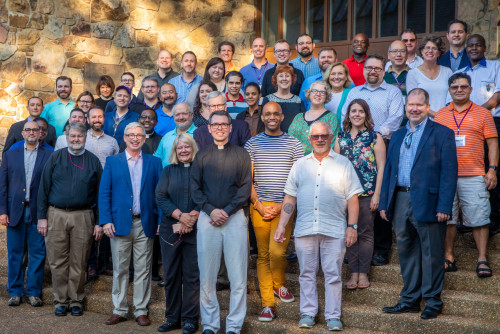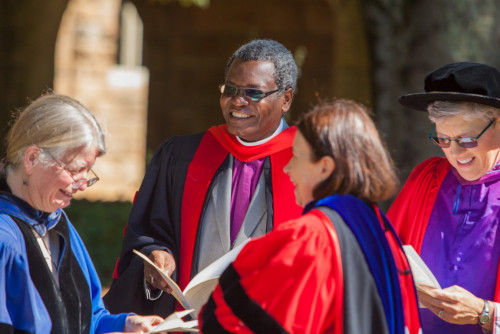Doctor of Ministry
The doctor of ministry program is designed to enable participants to attain excellence in the practice of ministry. The program provides persons actively engaged in professional ministry the opportunity to develop further the attitudes, skills, and knowledge essential to their ministry. The D.Min. program stresses the relationship between the practice of ministry and Biblical, historical, and theological knowledge. The level of class work in the D.Min. program assumes that the applicant has the general knowledge acquired in a M.Div. program. The D.Min. program is not intended to prepare persons for college or university teaching. It is intended for those who may wish to prepare for graduate study at the doctoral level or for various forms of teaching, to enhance their scholarly understanding of ministerial practice, or to engage in disciplined reflection in an area of ministry may wish to apply for the master of sacred theology (S.T.M.).
Students admitted to the program must complete a minimum of thirty semester hours with a grade point average of 3.00 or higher. Six of the hours must be achieved in the form of a project, which will be defended orally.
The student, working with the director of the advanced degrees program, will develop a program of study designed to accomplish his/her educational objectives. It is imperative that the program has integrity and coherence and not be simply the accumulation of credit hours.
Courses are designed to develop professional skills and to relate Biblical, historical, and theological materials to the practice of ministry. The normal paradigm is two classes each in four summers and registration for project hours after the fourth summer.
Project (click here to view sample projects)
The student will be required to complete a substantial project for six credit hours. The project should have a professional focus and opportunities for reflection on professional development for the integration of academic learning experiences and one’s own professional situation and for moving forward in one’s understanding and practice of ministry. Some possible methodological approaches are:
- Action/reflection model—a presentation of the results growing out of some direct engagement within a context of ministry.
- Program model—a description of a program (educational, liturgical, homiletical, pastoral, etc.) designed by the student for his/her work, with assessment of results.
- Thesis or essay—a study of some topic related to the integration of one’s academic work and professional focus.
The ministry project should demonstrate the candidate’s ability to identify a specific theological topic in ministry, organize an effective research model, use appropriate resources, and evaluate the results. The project should reflect the candidate’s depth of theological insight in relation to ministry.
Concentrations
Doctor of Ministry in Preaching (D.Min.)
The D.Min. in preaching concentration is offered in response to a growing need for post-M.Div. study, instruction, and critical practice in preaching. No more than eight students will be accepted into the D.Min. in preaching track each year in order to assure adequate support for their course study and thesis project. While fulfilling requirements for the D.Min., students in the D.Min. in preaching track will be required to:
- Complete a minimum of four ADP/Sewanee courses in homiletics; a course with a strong preaching component may be substituted with permission of the program director.
- Write a thesis or complete a project in homiletics. The process to be followed is identical to that of the general track D.Min.
A minimum of two courses in Biblical studies is recommended.
Doctor of Ministry in Liturgy (D.Min.)
The D.Min. in liturgy concentration builds on Sewanee’s unique strengths in liturgical studies and is offered in response to a growing need for post-M.Div. study, instruction, and critical practice in liturgy. No more than ten students will be accepted into the D.Min. in liturgy track each year in order to assure adequate support for their course of study and thesis/project. While fulfilling requirements for the D.Min., students on this track will be required to:
- complete five ADP/Sewanee courses in liturgy, plus a sixth course in liturgy or a related field (eligible courses are designated in their course description; in certain cases, a relevant course in another discipline, without the designation, may be substituted with permission of the director of the advanced degrees program).
- write a thesis or complete a project in liturgy. The process to be followed is identical to that of the general track D.Min.
Learning Outcomes
-
The student demonstrates evidence of critical thinking and advanced theological integration in theological disciplines appropriate to ministry.
-
The student’s final project enhances ministry skills or the practice of ministry, and has enhanced their own personal and spiritual maturity.



